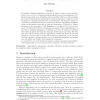Free Online Productivity Tools
i2Speak
i2Symbol
i2OCR
iTex2Img
iWeb2Print
iWeb2Shot
i2Type
iPdf2Split
iPdf2Merge
i2Bopomofo
i2Arabic
i2Style
i2Image
i2PDF
iLatex2Rtf
Sci2ools
CORR
2010
Springer
2010
Springer
Approximate Judgement Aggregation
We analyze judgement aggregation problems in which a group of agents independently votes on a set of complex propositions that has some interdependency constraint between them (e.g., transitivity when describing preferences). We generalize the current results by studying approximate judgment aggregation. That is, we relax the main two constraints assumed in the current literature. We relax the consistency constraint by measuring the fraction of inputs for which an aggregation mechanism returns an inconsistent result and we relax the independence constraint by defining a measure for the dependance of the aggregation for an issue on the votes on other issues. We define the problem of measuring the impact of such small relaxation on the class of satisfying aggregation mechanisms and raise the question of whether there exists an agenda for which the expansion of this class is non-trivial. We show that the recent works for preference aggregation of Kalai and Mossel fit into this framewo...
Aggregation Mechanisms | Approximate Judgment Aggregation | CORR 2010 | Education | Judgement Aggregation Problems |
Related Content
| Added | 24 Jan 2011 |
| Updated | 24 Jan 2011 |
| Type | Journal |
| Year | 2010 |
| Where | CORR |
| Authors | Ilan Nehama |
Comments (0)

